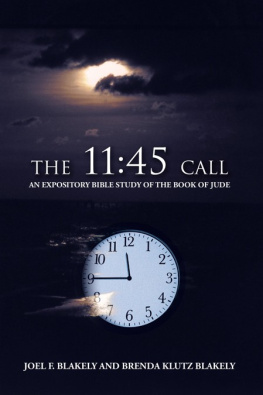THE CITY IN THE TWENTY-FIRST CENTURY
Eugenie L. Birch and Susan M. Wachter, Series Editors
A complete list of books in the series is available from the publisher
Edward J. Blakely My Storm
MANAGING
THE RECOVERY
OF NEW ORLEANS
IN THE WAKE
OF KATRINA
FOREWORD BY HENRY CISNEROS
UNIVERSITY OF PENNSYLVANIA PRESS
PHILADELPHIA
Copyright 2012 University of Pennsylvania Press
All rights reserved. Except for brief quotations used
for purposes of review or scholarly citation, none of this
book may be reproduced in any form by any means without
written permission from the publisher.
Published by
University of Pennsylvania Press
Philadelphia, Pennsylvania 19104-4112
www.upenn.edu/pennpress
Printed in the United States of America
on acid-free paper
1 2 3 4 5 6 7 8 9 10
Library of Congress Cataloging-in-Publication Data
Blakely, Edward James, 1938
My storm : managing the recovery of New Orleans in the wake of Katrina /
Edward J. Blakely. 1st ed.
p. cm. (The city in the twenty-first century)
Includes bibliographical references and index.
ISBN 978-0-8122-4385-7 (hardcover : alk. paper)
1. Blakely, Edward James, 1938 2. Hurricane Katrina, 2005. 3. Disaster relief
LouisianaNew Orleans. 4. Emergency managementLouisianaNew Orleans.
5. Urban policyLouisianaNew Orleans. 6. City planningLouisianaNew Orleans.
7. New Orleans (La.)Politics and government21st century.
I. Title. II. Series: The city in the twenty-first century.
HV636 2005 .N4 B53 2011
976.335064092dc23 2011026052
[B]
Azor Randolph was my maternal great grandfather
who lived as a slave leaving the Randolph Plantation
in Georgia for freedom after the Civil War walking with
his wife to California to find a new life. He lived well
past 100 years, some say 107 others 113. He was my
first hero. He was a horticulturalist, inventor and story
teller. All of my family is grateful for the gifts of wisdom
he bestowed on all of us. He taught us we can
conquer anything we set our minds to and the future
is only guaranteed to those that seek itevery day.
FOREWORD | HENRY G. CISNEROS
THE SCALE OF THE HURRICANE WAS IMMENSE. THE POWER OF the direct hit on a city was stunning. The suffering of the residents was shocking. And the challenges of the recovery effort were unprecedented in American history.
Of necessity, therefore, the strategy to bring New Orleans back from the brink required the best urban minds and most skillful public sector managers the nation could identify. Fortunately the New Orleans city administration found a person whose background, experience, and dedication qualified him at that levelEd Blakely.
I had known Professor Blakely by reputation as one of the nations most creative urban planners and most respected academics. His writings on urban solutions have shaped many ideas and careers over the years. I observed from afar his work as an urban administrator and courageous activist in Oakland and other cities. But it was during the working sessions that followed the massive civil disturbances in Los Angeles in 1992 that I first had the opportunity to see Ed in action and to work with him. In part because of my work in Los Angeles, president clinton asked me to serve as secretary of the u.s. Department of housing and urban Development in his cabinet. in that capacity I was able to collaborate with Ed once again, most importantly in designing policies to engage urban universities as anchor institutions in central city neighborhoods by applying their employment capabilities, academic assets, and community development potential.
When Ed was designated by Mayor Ray Nagin of New Orleans to coordinate the Katrina response, he asked me to chair the board of external advisors. From my experience at HuD, I knew that a city with daunting prospects in normal times would present heartbreaking challenges after an epic natural disaster. I also knew that Ed was one of the few leaders in the world who would be up to the task.
From the vantage point of the advisory committeewhich met in New orleans to review plans, to offer suggestions, and to make recommendations to state and national officialsI saw that ed willed the city onto a path to recovery. He and his colleagues extracted the best ideas from competing plans, steered resources to priority needs, jump-started bureaucratic organizations, and most importantly generated hope and inspired confidence that the job could be done.
The experiences and insights which fill this book are important for policy makers, for academic urban specialists, and for public-minded citizens everywhere. Looking to the past, My Storm is a first-person historical record of one of the highest profile and most decisive American events of the last decade. in the present, eds account constitutes a study of the fragility and the value of these complex social systems we call our cities. Most importantly, anticipating the future, ed makes us think about preparations in our own metropolitan areas for potentially massive disasters which may once have been unimaginable but which now appear with frequency in news reporting from around the world. Natural disasters and man-made destruction will be more damaging and tragic as they occur in increasingly populated areas of the globe. ed counsels that we need to think ahead to prevent massive human suffering and that we must prepare far in advance for large-scale rescue and recovery efforts.
Ed has devoted his personal energies and career to making life better for people who live in the cities of our world. most of the time that has meant ed is planning for progress. it takes a wise man to know how to apply his ideals and personal courage to envision progress amidst a crushing setback. That wisdom must then be buttressed by the herculean determination to make sure that one step backward is always countered with two steps forward. ed Blakely has always shown us how to take steps forward. in My Storm he shows us once again.
INTRODUCTION
I ARRIVED IN NEW ORLEANS ON JANUARY 7, 2007, THE 192ND anniversary of the historic Battle of New Orleans. I had been called to take command in a new and perhaps more daunting battle, for the life and soul of the nations most distinctive city. This was my first official day on the job as the czar to lead the post-Hurricane Katrina recovery effort.
New Orleans has one of the richest racial and cultural tapestries in the United States. Its where jazz emerged as an art form. It was a place of fame and fable. Tennessee Williams created splendid imagery for it. Marlon Brando gave it face and character in A Streetcar Named Desire. Great artists Louis Armstrong, Tina Turner, Josephine Baker, Mahalia Jackson, and Scott Joplin, and athletes such as football stars Marshall Faulk and the Manning brothers, were born or raised in the city.
For many personal and professional reasons, however, few of these greats called, or call, the city their current home. New Orleans is a gem woven into Americas historic fabric. But New Orleanians, both black and white, prefer its fable, myths, and faded glory to grappling with the real issues and problems that afflict the city.
Long before Katrina, New Orleans had descended from the Souths largest city in the 1940s and 1950s to a declining shell of a city by the 1970s, with rampant commercial and residential vacancies. It lost both luster and population to nearby Birmingham and Houston. The Mississippi River, the citys artery for commerce, has also been its demon. Overflowing its banks many times, the Mississippi nearly ruined the city in 1927, a fate averted only by blowing up the dikes near the city and conscripting some of the black community to fight the flood waters.





